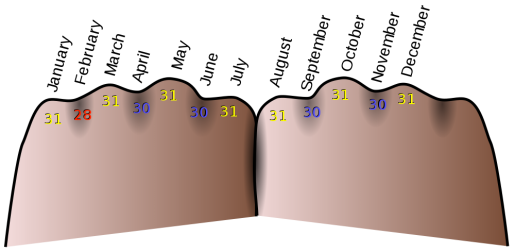
Either figuring out the days of the month, or about to punch the calendar.
One of the maddening things about calendars, specifically the Gregorian calendar used by the Western world since it was instituted by Pope Gregory XIII over 430 years ago, is that there’s no predictability about it. This year, Christmas was on a Sunday; next year, it’s on a Tuesday. That’s some confusing stuff, so researchers at Johns Hopkins University have a modest proposal to improve the calendar: completely reorganize the calendar to make everything happen on the same date forever.
The new system is called the Hanke-Henry Permanent Calendar, named for economist Steve Hanke and astrophysicist Richard Henry, the two Johns Hopkins professors who developed it. The goal for that calendar is consistency and clarity. If you liked Christmas on a Sunday (I didn’t), then Christmas would be the same month and day permanently. The way to do this, according to the Hanke-Henry Permanent Calendar, is to rearrange the calendar so you have two 30-month days followed by a 31-month day. Every five or six years, there would be an added Leap Week at the end of December to bring the calendar back into balance.
“Everybody has to redo their calendars. For sports schedules, for schools, for every damn thing. It’s completely unnecessary,” said Henry, whose new calendar uses January 1, 2012 as its starting point. “It’s really incredible that in the Middle Ages, they were able to invent a new calendar that was so accurate. The calendar I’m advocating isn’t nearly as accurate, but it’s far more convenient.”
Tags: Gregorian calendar, Pope Gregrory XIII, Johns Hopkins University, new calendar, organized calendar system, new calendar devised to make dates permanent, Richard Henry, Steve Hanke, Hanke-Henry Permanent Calendar, telling time, dates and times, calendars, organization, new calendar system devised featuring permanent dates







